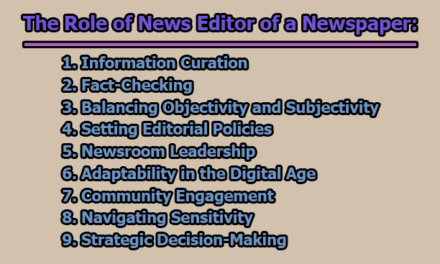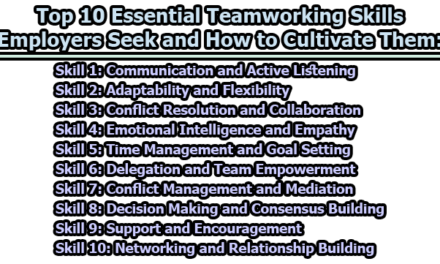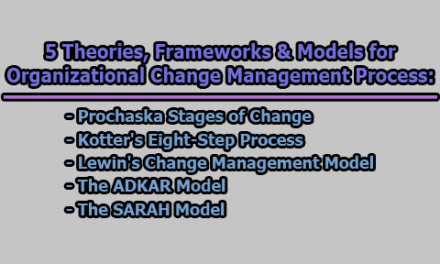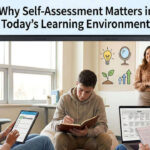Top 10 Best Ways to Improve Influencing Skills for Students:
In today’s competitive world, effective communication and influencing skills have become indispensable for success in various spheres of life, including education, career, and personal relationships. As a student, honing your ability to influence others positively can open doors to numerous opportunities, foster leadership qualities, and facilitate your academic and professional growth. In this article, we will explore the top 10 best ways to improve influencing skills for students, equipping them with the tools to make a lasting impact on others and achieve their goals.
Understanding Influencing Skills:
Influencing skills involve the art of communicating ideas in a compelling manner, motivating others to take action, and building trust and rapport with others. It’s not about forcing one’s opinions on others but rather about presenting ideas in a way that resonates with the audience, addresses their needs and concerns, and encourages collaboration and cooperation.
Effective influencing requires emotional intelligence, active listening, adaptability, and the ability to understand and empathize with different perspectives. It’s about finding common ground, highlighting shared values, and creating win-win situations that benefit all parties involved.
Importance of Influencing Skills for Students:
Improving influencing skills can bring numerous benefits to students during their academic journey and beyond:
a. Academic Success: In academic settings, students with strong influencing skills can effectively collaborate with peers, contribute to group projects, and positively influence class discussions and presentations.
b. Leadership Development: Influencing skills are essential for aspiring student leaders, helping them motivate and inspire their team members to achieve common goals and foster a sense of unity and purpose.
c. Networking and Relationship Building: Influencing skills are vital for building meaningful relationships with professors, mentors, and fellow students, which can lead to valuable networking opportunities and future recommendations.
d. Career Advancement: In the professional world, strong influencing skills can help students secure internships, job opportunities, and promotions by effectively presenting their ideas, convincing employers of their value, and negotiating favorable terms.
e. Conflict Resolution: Influencing skills can assist students in navigating conflicts and disagreements in a constructive and positive manner, fostering a harmonious and productive environment.
Top 10 Best Ways to Improve Influencing Skills for Students:
Now that we understand the importance of influencing skills, let’s explore the top 10 best ways for students to enhance their influencing abilities:
1. Active Involvement in University Activities: Active involvement in various university activities offers an excellent platform for students to practice and enhance their influencing skills. Joining clubs, organizations, and committees allows students to interact with diverse groups of people and collaborate on projects. Engaging in group discussions, expressing ideas, and persuading others to support initiatives provide valuable opportunities to develop effective influencing techniques.
Action Steps:
- Join clubs and organizations that align with your interests and goals.
- Volunteer for leadership roles within these groups to take on responsibilities that require influencing others.
- Participate actively in group meetings, discussions, and decision-making processes.
2. Volunteering for Leadership Roles:
Assuming leadership roles within university organizations is a powerful way to strengthen influencing skills. Leading a team or being responsible for planning and executing events requires effective communication, motivation, and the ability to garner support. Leadership positions offer hands-on experience in guiding and inspiring others towards a common vision, fostering essential skills for future success.
Action Steps:
- Seek opportunities to become a team leader, project manager, or committee head.
- Demonstrate strong leadership by setting clear goals, empowering team members, and resolving conflicts effectively.
- Collaborate with others to create an inclusive and supportive team environment.
3. Developing Emotional Intelligence: Emotional intelligence plays a pivotal role in influencing others. Understanding and managing emotions, both in oneself and in others, enhances communication and builds rapport. Empathy and emotional awareness help students relate to their peers and tailor their messages to connect with different individuals effectively.
Action Steps:
- Practice active listening to truly understand others’ perspectives and feelings.
- Reflect on your emotions and reactions to various situations to develop self-awareness.
- Show empathy towards others by putting yourself in their shoes and considering their viewpoints.
4. Effective Communication and Public Speaking: Clear and compelling communication is at the heart of influencing skills. Students should work on improving their verbal and non-verbal communication to convey their ideas confidently and persuasively. Public speaking workshops and practice sessions can help students develop their ability to deliver impactful speeches and presentations.
Action Steps:
- Take public speaking classes or participate in debate clubs to hone your communication skills.
- Practice articulating ideas concisely and confidently in front of a mirror or with friends.
- Utilize appropriate body language and vocal tone to enhance the impact of your message.
5. Building Strong Relationships: Building strong relationships is essential for successful influencing. Students should focus on cultivating trust, respect, and mutual understanding with their peers, professors, and mentors. By investing time and effort in building meaningful connections, students can gain support for their ideas and initiatives.
Action Steps:
- Actively engage in networking events and establish connections with individuals from diverse backgrounds.
- Show genuine interest in others’ opinions and experiences during conversations.
- Follow up with peers and mentors regularly to maintain relationships.
6. Gaining Experience in Sales and Customer Service: Working in sales or customer service roles can significantly enhance influencing skills. In these positions, students learn how to identify customers’ needs, address objections, and effectively communicate the value of products or services. These experiences teach students to tailor their messages to the interests and preferences of their audience.
Action Steps:
- Seek part-time jobs or internships in sales or customer service.
- Learn persuasive sales techniques, such as understanding customer pain points and offering solutions.
- Embrace customer feedback as an opportunity to improve your influencing approach.
7. Seeking Mentorship and Guidance: Mentorship provides valuable insights and guidance on how to navigate various challenges, including developing influencing skills. Seeking advice from professors, industry professionals, or senior students can offer valuable perspectives and strategies for effective influencing.
Action Steps:
- Approach potential mentors with a clear goal in mind and a willingness to learn from their experiences.
- Listen actively to their advice and apply it to your personal development.
- Show appreciation for their guidance by acknowledging their impact on your growth.
8. Embracing Feedback and Self-Reflection: Feedback and self-reflection are essential components of personal growth. Students should actively seek feedback on their influencing efforts from peers and mentors. Additionally, self-reflection allows students to assess their strengths and areas for improvement in influencing skills.
Action Steps:
- Request feedback from peers and mentors after group activities or presentations.
- Analyze your influencing successes and challenges, and identify patterns for improvement.
- Set specific goals for enhancing your influencing skills based on feedback and self-reflection.
9. Understanding Different Perspectives: The ability to understand different perspectives is vital for effective influencing. Students should learn to see situations from various angles and tailor their arguments to address the concerns and interests of their audience. This approach fosters a collaborative and inclusive environment.
Action Steps:
- Engage in conversations with individuals holding diverse viewpoints on various topics.
- Ask open-ended questions to understand others’ reasoning and beliefs.
- Practice presenting your ideas in a way that resonates with different groups of people.
10. Continuously Learning and Adapting: Influencing skills evolve with experience and knowledge. Students should stay open to learning new strategies, techniques, and approaches to enhance their influencing abilities continually. Being adaptable and flexible in their communication style allows students to connect with various personalities effectively.
Action Steps:
- Stay informed about current events, trends, and best practices related to communication and influencing.
- Attend workshops, seminars, or webinars on influencing and related skills.
- Seek opportunities to apply new knowledge and adapt your influencing style accordingly.
Applying Influencing Skills in Academic Settings:
In the academic setting, students can apply their influencing skills in various ways:
i. Group Projects: Effective influencing helps students guide group discussions, gain buy-in for their ideas, and foster collaboration among team members.
ii. Classroom Presentations: Strong influencing skills enable students to deliver compelling presentations that engage their peers and leave a lasting impact.
iii. Class Discussions: Influencing allows students to respectfully share their opinions, support their arguments with evidence, and influence the opinions of their peers in a constructive manner.
Applying Influencing Skills in Extracurricular Activities:
Extracurricular activities provide numerous opportunities for students to apply their influencing skills:
i. Student Leadership: In leadership roles within clubs and organizations, students can inspire their team members, influence event planning, and drive the organization toward its goals.
ii. Event Organization: Influencing helps students gain support from sponsors, vendors, and attendees for successful event execution.
iii. Community Service: Influencing skills can be employed to motivate volunteers, secure donations, and garner community support for service initiatives.
Applying Influencing Skills in Career Development:
In career development, influencing skills can be invaluable:
i. Job Interviews: Effective influencing helps students present themselves as strong candidates, highlight their skills and accomplishments, and make a positive impression on potential employers.
ii. Networking Events: Strong influencing skills enable students to build rapport with professionals, make meaningful connections, and leave a lasting impression.
iii. Internships and Work Placements: Influencing skills assist students in standing out in competitive environments, gaining the trust of supervisors, and contributing effectively to the organization.
Overcoming Challenges in Improving Influencing Skills:
Improving influencing skills can be a gradual process, and students may encounter challenges along the way. Some common challenges and strategies to overcome them include:
i. Fear of Rejection: Overcome the fear of rejection by recognizing that not every attempt at influencing will be successful, and learning from each experience regardless of the outcome.
ii. Lack of Confidence: Build confidence through practice, preparation, and focusing on past successes in influencing situations.
iii. Resistance from Others: Address resistance by actively listening to others’ concerns, acknowledging their perspectives, and finding common ground for mutual understanding.
iv. Inconsistent Results: Continuously refine influencing techniques based on feedback and self-reflection to achieve more consistent and positive results.
In conclusion, influencing skills are vital for students looking to thrive in their academic journey and future careers. The ability to inspire confidence, gain support, and effectively communicate ideas opens doors to numerous opportunities and fosters meaningful relationships with peers, professors, and potential employers. By actively engaging in university activities, seeking leadership roles, developing emotional intelligence, and continuously learning and adapting, students can improve their influencing skills and position themselves for success in all aspects of their personal and professional lives. With dedication and practice, students can become influential leaders who positively impact their communities and make a difference in the world.
Frequently Asked Questions [FAQs]:
What are influencing skills, and why are they important in inspiring confidence in others?
Influencing skills refer to the ability to persuade, motivate, and gain genuine support from colleagues, clients, and superiors for ideas and decisions. They are essential for inspiring confidence in others by effectively communicating a compelling vision for the future and building trust and credibility.
Why are influencing skills highly sought after in graduate job roles like project management and client-facing positions?
Influencing skills are crucial in graduate job roles involving project management and client-facing positions because they enable effective leadership, collaboration, and relationship-building. These skills help graduates gain support from team members, clients, and stakeholders, leading to successful project execution and client satisfaction.
How can graduates demonstrate their influencing skills during job interviews?
Graduates can showcase their influencing skills during job interviews by providing specific examples of times when they persuaded others, resolved conflicts, or gained support for their ideas. Behavioral interview questions, such as describing a situation when they had to bring others around to their way of thinking, offer opportunities to highlight their influencing abilities.
How can students improve their influencing skills during their university years?
Students can improve their influencing skills during their university years by actively involving themselves in group activities, volunteering for leadership roles, and seeking mentorship from experienced individuals. Joining public speaking clubs, participating in debates, and engaging in customer service roles also offer opportunities for skill development.
What role does emotional intelligence play in influencing skills?
Emotional intelligence is a key component of influencing skills as it helps individuals understand and manage emotions, empathize with others, and adapt their communication style to connect effectively with different people. Being emotionally intelligent allows individuals to build rapport and trust, making their influencing efforts more successful.
How can graduates continue to enhance their influencing skills in the workplace?
Graduates can continue to enhance their influencing skills in the workplace by seeking feedback from colleagues and supervisors, reflecting on their influencing efforts, and continuously learning and adapting to new communication techniques and strategies. Engaging in professional development opportunities and networking can also contribute to skill refinement.
Can influencing skills be applied outside of the workplace?
Yes, influencing skills are valuable beyond the workplace and are applicable in various aspects of life. Whether in social settings, community involvement, or personal relationships, effective influencing helps individuals communicate ideas, resolve conflicts, and inspire others to take positive actions.
How do influencing skills contribute to effective leadership?
Influencing skills are integral to effective leadership as they enable leaders to gain buy-in from their team members, motivate and inspire them toward common goals, and build a cohesive and high-performing team. Leaders who can influence positively can drive organizational success and create a positive work culture.
Can individuals with introverted personalities also possess strong influencing skills?
Yes, individuals with introverted personalities can possess strong influencing skills. Effective influencing is not solely about being outgoing or assertive but also about understanding others’ perspectives, active listening, and delivering persuasive messages with authenticity and conviction.

Library Lecturer at Nurul Amin Degree College










